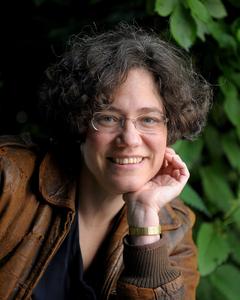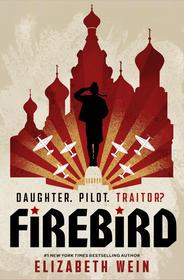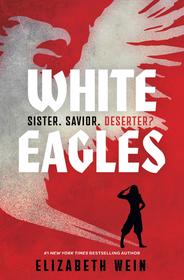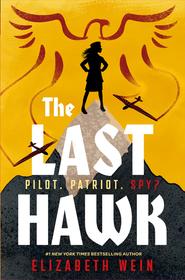
|
|
| Elizabeth Wein (photo: David Ho) |
|
Elizabeth Wein was born in New York and grew up in England, Jamaica, and Pennsylvania. She holds U.S. and British citizenship and has lived in Perth, Scotland, since 2000, where she earned her private pilot's license. Flight inspires her fiction, including the #1 New York Times bestseller Code Name Verity. Wein recently spoke with Shelf Awareness about her upcoming Hi-Lo series, War Birds, which follows young women pilots of different nationalities on their World War II journeys. The first three titles--Firebird, The Last Hawk, and White Eagles--are available in the U.S. from Union Square & Co.
What is a "Hi-Lo" reader?
Hi-Lo is a portmanteau to describe readers of "High interest age, Low reading ability." There are many reasons a teen might wind up in the "Hi-Lo" or reluctant reader category: dyslexia, learning difficulties, English as a second language, social and emotional issues. The idea of the Hi-Lo book is to provide accessible and interesting reading material to try to break the chain and make reading a pleasure rather than a struggle or a chore.
How is writing a Hi-Lo book different from writing a traditional novel for young readers, and how is it the same?
The writing is the same, but the editing is very different. I originally wrote the War Birds series for the Scottish publisher Barrington Stoke, who pioneered high-quality books aimed at dyslexic readers in the United Kingdom. I was hugely impressed with their encouragement during the writing process. I wrote as I'd write any novel, and then the text was edited to bring it in line with their reluctant reader guidelines. We broke up the story into sections containing short chapters and removed or changed words that are likely to trip up dyslexic readers. For example, we used the American spelling of czar rather than the British tsar. In decoding tsar it's easy to confuse it with star, whereas czar is merely unfamiliar and unlikely to be confused with another word.
I have heard in the past that Hi-Lo readers should have contemporary settings because historical or speculative settings challenge the readers too much. Does that line of thinking give the audience too little credit?
Aren't human storytelling traditions speculative through time and across cultures? Many gatekeepers forget that young readers of all kinds are already complex human beings. Loads of kids love speculative settings. A historical setting is no less difficult to take on board than fantasy in terms of the imaginative leaps it requires. I write both fantasy and historical fiction, and they're surprisingly similar in terms of worldbuilding. Experience has given me a good sense of what will confuse the reader, reluctant or not. One of my tricks is to include details that either directly relate to the world as the reader knows it or are fascinating because they contrast so hard with the reader's world.
 In Firebird, you tell the story of a young Soviet woman. Was it more difficult to find research sources on the USSR than Western Europe?
In Firebird, you tell the story of a young Soviet woman. Was it more difficult to find research sources on the USSR than Western Europe?
When Barrington Stoke asked if I'd write something like Code Name Verity for them, I was writing my first nonfiction for teens, A Thousand Sisters: The Heroic Airwomen of the Soviet Union in World War II. I was up to my ears in research on the USSR and its wartime aviators, so Firebird seemed a wonderful opportunity to make up my own story based on the real stories I was learning about.
It was more difficult to find mainstream sources on the Soviet women aviators than it is when researching Western topics, but we are lucky in that these women talked about themselves a lot. After Stalin's death, and with the relaxing of some of the restrictions the Soviet people had suffered under his terrifying regime, these women published memoirs, gave interviews, and even made movies about their wartime adventures. A surprising number of their memoirs have been translated into English. An American pilot named Anne Noggle, who'd been a member of the Women's Air Force Service Pilots during World War II, went to Russia in the early 1990s to meet her sisters-in-flight and interview them.
 In White Eagles, the main character suffers a devastating loss. How did you balance her grief with the action to keep her choices as a character believable?
In White Eagles, the main character suffers a devastating loss. How did you balance her grief with the action to keep her choices as a character believable?
It felt instinctive. I have suffered enough loss in my life that I allowed Kristina to act as I felt she would naturally act under the circumstances. In a sense, I layered a part of myself into her character, something I no doubt do, usually without thinking about it, with all my characters.
One thing that I stumbled across which worked quite well to show Kristina's grief while still allowing her to act, was to put the voice of her lost loved one in her head BEFORE she loses him. This way, it feels quite natural to have him coaxing her along and teasing her in her imagination even after he's no longer with her--and her loss makes that remembered living voice more poignant. She acts in honorof her lost loved one, and to live up to his memory.
In The Last Hawk, the heroine must prove her worthiness to Germany when the Nazi Party's agenda threatens her values and her existence. What made this story an important one to tell for readers now?
 I don't like to be heavy-handed with moral messages in my stories, but if there's one hill I'm going to die on, it is "take responsibility for your own actions." This includes recognizing and atoning for your mistakes, which leads to the ability to change your mind and to choose another path. Increasingly, today's readers are under pressure to pick sides, as if everything that comes their way is a simple choice between opposites. That's rarely true. We're taught that it's courageous and honorable to stand up for the things we're taught to believe in, but it takes far more courage to question those beliefs and come to an individual conclusion. Individual integrity is as relevant and important in our time as it was in the past. It is relevant and important for all time.
I don't like to be heavy-handed with moral messages in my stories, but if there's one hill I'm going to die on, it is "take responsibility for your own actions." This includes recognizing and atoning for your mistakes, which leads to the ability to change your mind and to choose another path. Increasingly, today's readers are under pressure to pick sides, as if everything that comes their way is a simple choice between opposites. That's rarely true. We're taught that it's courageous and honorable to stand up for the things we're taught to believe in, but it takes far more courage to question those beliefs and come to an individual conclusion. Individual integrity is as relevant and important in our time as it was in the past. It is relevant and important for all time.
What do you feel the setting of World War II and the aviation world specifically have to teach modern youth?
I like to think these stories may inspire young people, and young women in particular, to think outside the box and investigate careers that might not seem obvious to them--aviation, but also a range of other things, as the young women do in these stories. I believe young people can be inspired in today's world by the actions of people in past times. The events in my stories and the women who inspired them were all real. At the heart of my storytelling is a desire to make people aware of the amazing unsung heroes and achievers who paved the way for us in another time, and who can continue to show us the way in our own time.
What projects can we expect to see from you next?
I'm working on a fantasy! I'm also hoping to write more nonfiction. I'm particularly fascinated by Antarctica at the moment, and I'm working on coming up with an angle to write about it. --Jaclyn Fulwood, youth services manager, Allen County Public Library

